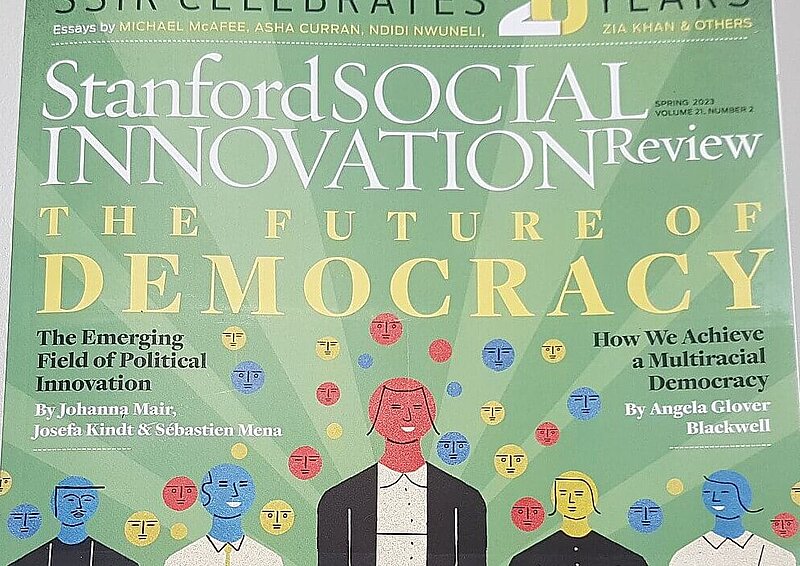
Hertie School team publish article about political innovation in Stanford Social Innovation Review.
Berlin, 22 February 2023. Social innovation initiatives aiming to improve the way we meet social needs have traditionally stopped short of direct political engagement. However, to counter trends like increasing polarisation, right-wing populism, social inequality and authoritarianism, new political innovation initiatives are doing just that. Hertie School Professor of Organisation, Strategy and Leadership Johanna Mair, Research Associate Josefa Kindt and Professor of Organisation and Governance Sébastien Mena examine these initiatives in their article “The Emerging Field of Political Innovation”, published in the spring 2023 issue of the Stanford Social Innovation Review. The authors spoke with professionals in public administration, business, academia, organised civil society and politics worldwide to understand this phenomenon.
Social and political change interrelated
In Germany, the non-profit organisation JoinPolitics seeks and supports talents with innovative ideas across the political spectrum to find solutions to mounting threats against democratic principles of justice, equality, representation and civic participation. Another non-profit, Brand New Bundestag, uses grassroots mobilisation to support progressive social policy-making and the campaigns of political candidates who promote marginalised communities’ interests. These are just two examples of what the authors call political innovation, which they define as the citizen-led practice of diagnosing problems in the political system and collectively working toward solutions to strengthen and revitalise democracy.
“The term political innovation encourages us to think of social and political change as interrelated,” says Johanna Mair. “The field leverages the tools of social innovation like grassroots organising to impact economic and political life. Though approaches to pro-democratic work like political activism and political entrepreneurship are nothing new, political innovators take them a step further, trying to reform the political system from within by, for instance, supporting young political talents or crowdsourcing solutions to political problems.”
Actors and foci of political innovation
According to the authors, there are three central actors in political innovation: innovators, orchestrators and enablers. Innovators assume responsibility for, develop, and introduce solutions that correspond with democratic principles; orchestrators build and coordinate the field of political innovation; and enablers provide the financial resources. While the work of these actors takes different forms, activities and practices, the researchers define three main areas: citizens, leaders and political structures. Citizen-focused work mobilises citizens who are or feel left out of the political system. Leader-focused work scouts and reaches out to politically underrepresented groups through training and support activities. Lastly, structure-focused work targets policies that do not sufficiently address democracy-related problems and aims to change both rules in public administrations and laws at the regional and national levels.
The authors note that the rise of political innovation initiatives both testifies to societies’ fear of losing democracy and shows a willingness to improve the system constructively. “Political innovation aims to redefine political responsibility by rendering ‘the social’ political and ‘the political’ social. Its protagonists know that social change requires political change, and the urgency they attribute to rescuing and rejuvenating democracy is manifested in their work,” says Mair.
Read the full paper in the Stanford Social Innovation Review.
The Hertie School will be hosting an event (in German) with Professor Mair and speakers from JoinPolitics and Brand New Brandenburg on 27 February at the Quartier Zukunft, Deutsche Bank. Register now .
The Hertie School in Berlin prepares exceptional students for leadership positions in government, business, and civil society. The school offers master’s programmes, executive education and doctoral programmes, distinguished by interdisciplinary and practice-oriented teaching, as well as outstanding research. Its extensive international network positions it as an ambassador of good governance, characterised by public debate and engagement. The school was founded in 2004 by the Hertie Foundation, which remains its major funder. The Hertie School is accredited by the state and the German Science Council. www.hertie-school.org
The Hertie School is not responsible for any content linked or referred to from these pages. Views expressed by the author/interviewee may not necessarily reflect the views and values of the Hertie School.
More about our experts
-
Johanna Mair, Professor of Organization, Strategy and Leadership
-
Sébastien Mena, Professor of Organization and Governance
